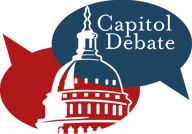5 Ways Debate Helps Gifted Students Rise to the Top
Debate skills translate well beyond the competition, it empowers students for life
Numerous studies have shown the benefits and advantages of high school debate programs for nearly every type of student from every cultural and socioeconomic background. But when it comes to kids who are already classified as gifted and talented and/or enrolled in Advanced Placement programs, debate can make the difference between doing well academically and rising to the top of the class.
Here are just a few ways speech and debate programs benefit students.
Debaters are far ahead of their peer groups
Preparing for a debate tournament is similar to writing a senior thesis; students are required to research a topic thoroughly, process information quickly in order to analyze and interpret findings, translate complex ideas into simple terms through both written and oral communication, and so much more.
In fact, “no undergraduate class or activity compares to debate as a means of teaching students methods of research,” according to a study conducted by Jeff Parcher for the Georgetown Philodemic Debate Society. Because debate students engage in 20 hours or more a week of preparation, they gain more experience in research in one year than in all the rest of their studies combined -- again putting them far ahead of their peers even into their college years.
Parcher identifies numerous areas in addition to research where debate students are well ahead of their peers in terms of both academic achievement and intellectual maturity. They include:
- enhanced critical thinking
- oral communication
- listening and note taking
- organization and arrangement
Debate fosters healthy competition among the best students
While debate participation teaches kids skills such as teamwork and collaboration - helping them to work well with others -- it also is grounded in competition. This highly competitive environment builds confidence among students and also encourages them to strive toward their goals. In addition, the friendly competition that is the cornerstone of successful debate programs encourages students to raise the bar among themselves and their peers not just in debate but in school as well. From SAT and ACT scores to test grades and more, debate students often compete within other areas of life, helping them again rise to the top.
Debate creates leaders
A quick Google search of 2014 valedictorians who participated in debate returns more than 9 million results, from large schools in urban environments to those in small, rural towns. Debate produces students who lead the way not only in high school, but in college and into adulthood. Debaters - and especially debate team leaders -- have gone on to become U.S. presidents, activists, judges, producers, actors and other world leaders.
Research conducted by Kent Colbert and Thomas Biggers found that many top corporate executives and high-ranking officials in all branches of government are former high school debaters. The strong listening skills, self-confidence and presentation skills that debate teaches help students to become leaders in their schools and communities. Additionally, research shows that many former debaters are very politically active and engaged in their communities.
Students who debate get into the top colleges
In an article discussing the value of debate, Professor Minh A. Luong from Yale University says colleges and universities are looking for students with strong grades “who can also set themselves to an endeavor and succeed in extracurricular activities,” including debate.
In his research, Luong also references a Wall Street Journal report that concluded “participation in drama and debate has significantly increased the success rate of college applicants at all schools which track such data. State and national award winners have a 22-30 percent higher acceptance rate at top tier colleges, and being captain of the debate team “improved an applicant’s chances by more than 60 percent, compared with the rest of the pool,” according to the report.
Debaters earn advanced degrees
Higher GPAs and standardized test scores can help students get into top colleges, and being a member of a debate team contributes to higher college acceptance rates as well. According to the American Forensic Association, 90 percent of debaters go on to earn at least one graduate degree.
In another study by R.J. Matlon and L.M. Keele, of 703 former debaters surveyed, 633 had at least one advanced degree, and 209 had more than one. Additionally, four in 10 had law degrees, four in 10 had masters degrees and two in 10 had a Ph.D. or other doctoral degree.
